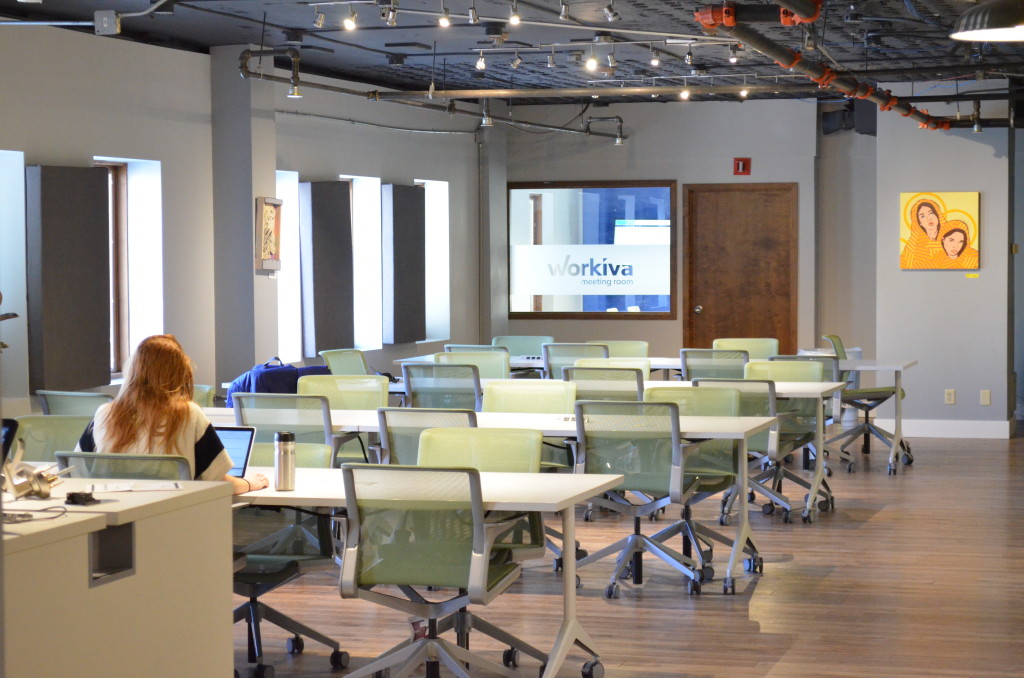During the workday, Derek Brooks, Jon Thompson, and Andrew Kirpalani run into each other in the break room and chat about the weather. They send office-wide GIF messages about someone making a too-strong pot of coffee. They help each other with those ever-present printer problems.
But they aren’t co-workers. The three Des Moines-based professionals work for very different businesses — a non-profit, an e-commerce company, and a couple tech firms. They all just happen to share one virtual office space.

It’s an arrangement that’s becoming more and more common. According to a 2014 study by Freelancers Union, an independent worker advocacy group, there are 53 million Americans working as freelancers. Of that, over 20 million are full-time independent contractors. Another nearly 3 million are small business owners with less than five employees. And while many work out of their bedrooms and take meetings at the local coffee shop, a growing number of freelancers, telecommuters, and small business owners are looking to leave the home office behind.
That’s where virtual offices come in. While the name implies they’re odd digital hangouts, virtual offices are brick-and-mortar locations where startups and freelancers can work, collaborate, and meet with clients. These co-working spaces offer all the amenities of a corporate office — things like Wi-Fi, meeting spaces with doors, and desks with nearby outlets — but come with a small price tag. According to a study by Deskmag , an online magazine covering the co-working industry, at least 110,000 people are co-working in 2,500 different virtual office spaces. Many of them are in the Midwest, at places like CoCo in the Twin Cities, Onward Co-working in Chicago, and Nebula in St. Louis, just to name a few.
In downtown Des Moines there’s Gravitate. Founded by Iowa tech entrepreneur Geoff Wood, Gravitate was designed as a hub for startups in the city. Since opening in the fall of 2014, it’s also become a place for remote workers to call home.
Derek Brooks, the only Iowa-based employee of the Chicago e-commerce company Modest , has a bullpen for one reason: human interaction. While his colleagues in the Windy City could exchange ideas and talk every day, before setting up shop at Gravitate, he felt isolated as he worked (shirtless) at home. “I’m a software engineer, and I just don’t like working out of my house all the time,” Brooks says. “It gets very boring. I like to be here just so I can see other humans. I think the biggest thing is just getting out of your house and being around these awesome people doing amazing things. It’s just good for you.” And Brooks wants to see more at-home workers taking advantage of what virtual offices can offer.

Jon Thompson used to be one of those cooped up at home. The owner of two small Des Moines tech companies, StickShift and Evolve, Thompson used to work from his house. But when your home is your office, the two can easily meld together. Gravitate’s “bullpen” — a large, open room with plenty of desk space — was the perfect solution. For a monthly membership, professionals can come use one of the co-working tables all day, every day.
Thompson didn’t need a formal office. He just needed someplace to show up in the morning and leave at night. “I sit down at one of the desks and take all my stuff when I leave,” he says. And the simple fact that he can do that, leave the office behind for the day, makes all the difference.
Not all Midwestern virtual offices are so informal, though. Some, like the ones Servcorp owns all around the country, including downtown Chicago, are designed with a more professional (read: less creative-type) feel. Instead of coming into the virtual office daily, home-based professionals can use select services. If an independent consultant doesn’t want business calls on his cell phone, he can have Servcorp’s receptionists take his calls. If a lawyer needs to meet with clients a few times a month, she can schedule time in the boardrooms. A tax attorney can opt to use virtual office space during tax season but then use only the address during the rest of the year.
Juliette Colón, the company’s marketing director, says that’s what clients like most about the more traditional virtual office system.

Colón says that even though Servcorp isn’t focused on creating a casual, community-building atmosphere like Gravitate’s, there are still opportunities for networking that wouldn’t come with a traditional office. “It’s kind of like co-working, but it’s on a different level — a much more professional level,” she says.
But it’s the strong, diverse community that resonates with most Gravitate users. Andrew Kirpalani, a project manager for Bunchball , a gamification software company based half in Iowa and half in California, values most of how the system affects his company’s culture and community.












